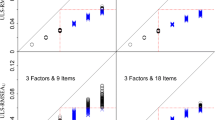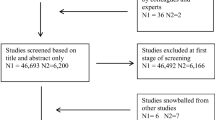Abstract
One of the motivations frequently cited by Sen and Nussbaum for moving away from a utility metric towards a capabilities framework is a concern about adaptive preferences or conditioned expectations. If utility is related to the satisfaction of aspirations or expectations, and if these are affected by the individual’s previous experience of deprivation or wealth, then utility cannot provide a basis for assessing well-being, equality or social justice which is independent of the initial distribution. This paper contributes to the identification of adaptive expectations by using ten years of panel data from the British Household Panel Survey to study the process of adaptation based on the individual’s own previous experience. Subjective assessments of financial well-being at time t, for individuals with a given income level, are compared according to the income trajectory of the individual over the previous one to nine years. Descriptive statistics are followed by multivariate analysis, introducing controls for changes in need (family size and composition, disability), and possible social reference groups (for example, ethnicity and employment status). Fixed effects regressions allow for individual variation in the scaling of satisfaction. The results show that year on year, individuals who have experienced a fall in income since the previous year are less satisfied than those who have a steady income, suggesting that subjective assessments may be made in comparison with previous experience. Surprisingly, individuals who have experienced an increase in income are also less satisfied. This suggests that income is a poor proxy for satisfaction but it does not provide firm evidence for the existence of adaptation over the short term. Over a longer period, those who have experienced falling incomes are less satisfied than those who have had constant income, while those who have experienced rising incomes are no more satisfied than those who have had constant incomes. This suggests that over a longer period, adaptation to changes in income is asymmetric: people adapt to rising incomes but less so falling incomes. The paper concludes that satisfaction with income is influenced by objective circumstances, and to changes in objective circumstances, in complex ways. In particular, the process of adaptation to rises in income masks long-term differences in outcomes for individuals and makes subjective assessments of well-being a flawed basis for judgements of inequality or social justice. An objective normative standard, such as is offered by the capabilities framework, avoids social evaluations being unduly influenced by individuals’ past experiences.
Similar content being viewed by others
References
Abbey, A. and F. Andrews: 1986, ‘Modelling the psychological determinants of life quality’, in F. Andrews (ed.), Research on the Quality of Life Institute for Social Research, University of Michigan).
J. Aldrich F. Nelson (1984) Linear Probability, Logit and Probit models Sage Beverly Hills, CA
E. Bardasi S. Jenkins J. Rigg (2003) Documentation for Derived Current and Annual Net Household Income Variables, BHPS waves 1–10 Institute for Social and Economic Research, University of Essex Colchester
A. Chan M. Ofstedal A. Hermalin (2002) ArticleTitle`Changes in subjective and objective measures of economic well-being and their interrelationship among the elderly in Singapore and Taiwan Social Indicators Research 57 263–300 Occurrence Handle10.1023/A:1014787712820
A. Clark (1999) ArticleTitleAre wages habit-forming? Evidence from micro-data Journal of Economic Behavior and Organization 39 179–200 Occurrence Handle10.1016/S0167-2681(99)00031-1
A. Clark E. Diener Y. Georgellis R. Lucas (2003) Lags and Leads in Life Satisfaction: A test of the Baseline Hypothesis. DIW Berlin Discussion Paper 371 German Institute for Economic Research Berlin
A. Clark Y. Georgellis P. Sanfey (1998) `Job satisfaction, wage changes and quits: evidence from Germany' S. Polachek (Eds) Research in Labor Economics EditionNumber17 JAI Press London
J. Davis (1984) ArticleTitleNew money, an old man/lady and ‘two’s company’: Subjective welfare in the NORC general social surveys, 1972–1092 Social Indicators Research 15 319–350 Occurrence Handle10.1007/BF00351443
K. Neve ParticleDe H. Cooper (1999) ArticleTitleThe happy personality: A meta analysis of 137 personality traits of subjective well-being Psychological Bulletin 125 197–229
E. Diener R. Lucas (1999) `Personality and subjective well-being D. Kahneman E. Diener and N. Schwarz (Eds) Well-Being: the foundations of hedonic psychology Russell Sage Foundation New York
E. Diener E. Sandvik L. Siedlitz M. Diener (1993) ArticleTitleThe relationship between income and subjective well-being: relative or absolute? Social Indicators Research 28 195–223 Occurrence Handle10.1007/BF01079018
R. Easterlin (1995) ArticleTitleWill raising the incomes of all increase the happiness of all? Journal of Economic Behavior and Organization 27 35–47 Occurrence Handle10.1016/0167-2681(95)00003-B
R. Easterlin (2001) ArticleTitleIncome and happiness: Towards a unified theory The Economic Journal 111 IssueIDJuly 465–484 Occurrence Handle10.1111/1468-0297.00646
R. Frank (1997) ArticleTitleThe frame of reference as a public good The Economic Journal 107 1832–1847 Occurrence Handle10.1111/1468-0297.00261
S. Frederick G. Lowenstein (1999) `Hedonic adaptation D. Kahneman E. Diener and N. Schwarz (Eds) Wellbeing: The Foundations of Hedonic Psychology Russell Sage Foundation New York
Frey, B. and A. Stutzer: 2002, ‘What can economists learn from happiness research’, Journal of Economic Literature XL(June), pp. 402–435.
K. Gardiner J. Hills (1999) ArticleTitlePolicy implications of new data on income mobility The Economic Journal 109 F91–F111 Occurrence Handle10.1111/1468-0297.00404
C. Graham S. Pettinato (2002) ArticleTitleFrustrated achievers: winners, losers and subjective well-being in new market economies Journal of Development Studies 38 IssueID4 100–140 Occurrence Handle10.1080/00220380412331322431
C. Grund D. Sliwka (2003) The Further we Stretch, the Higher the Sky: on the impact of wage increased on job satisfaction. Bonn Econ Discussion Paper 1/2003 University of Bonn Bonn
R. Inglehart J.R. Rabier (1986) Aspirations adapt to situations – but why are the Belgians so much happier than the French? A cross-cultural analysis of the subjective quality of life F. Andrews (Eds) Research on the Quality of Life Institute for Social Research University of Michigan
D. Kahneman A. Tversky (1979) ArticleTitle`Prospect theory: an analysis of decision under risk Econometrica 47 263–291
Kahneman D., A. Krueger, D. Schkade, N. Schwarz and A. Stone: 2003, ‘A survey method for characterizing daily life experience: the Day Reconstruction Method (DRM)’. Paper presented at Centre for Economic Performance seminar, London School of Economics, 14 July
T. Kasser R. Ryan (2001) Be careful what you wish for: optimal functioning and the relative attainment of intrinsic and extrinsic goals P. Schmuck and K. Sheldon (Eds) Life Goals and Well-Being: Towards a Positive Psychology of Human Striving Hogrefe and Huber Kirkland, WA
Lelkes, O.: 2002, ‘Well-Being and Inequality in Transition: The case of Hungary’. Ph.D., Thesis, London School of Economics
Michalos, A.: 1991, ‘Global Report on Student Well-Being. Volume 1: Life Satisfaction and Happiness’ (Springer-Verlag, New York)
T. Modood R. Berthoud J. Lakey J. Nazroo P. Smith S. Virdee S. Beishon (1997) Ethnic Minorities in Britain: Diversity and Disadvantage Policy Studies Institute London
M. Nussbaum (2001) ArticleTitleAdaptive preferences and women’s options Economics and Philosophy 17 67–88 Occurrence Handle10.1017/S0266267101000153
A. Oswald (1997) ArticleTitleHappiness and economic performance The Economic Journal 107 IssueIDNovember 1815–1831 Occurrence Handle10.1111/1468-0297.00260
J. Pahl (1989) Money and Marriage Macmillan Basingstoke
M. Ravallion M. Lokshin (2001) ArticleTitleIdentifying welfare effects from subjective questions Economica 68 335–357 Occurrence Handle10.1111/1468-0335.00250
Rigg J. and T. Sefton: 2003, ‘Income Dynamics and the Lifecycle: evidence from 10 waves of the British Household Panel Survey’, forthcoming CASE paper. Centre for Analysis of Social Exclusion, (London School of Economics, London)
A. Sen (1987) The Standard of Living Cambridge University Press Cambridge
A. Stutzer (2004) ArticleTitleThe role of income aspirations in individual happiness Journal of Economic Behavior and Organization 54 IssueID1 89–109 Occurrence Handle10.1016/j.jebo.2003.04.003
Taylor M. (ed): 2001, ‘British Household Panel Survey User Manual. Introduction, Technical Reports and Appendices’, ESRC Research Centre on Micro-Social Change, University of Essex, Colchester
N. Tomes (1986) ArticleTitleIncome distribution, happiness and satisfaction: a direct test of the interdependent preferences model Journal of Economic Psychology 7 425–446 Occurrence Handle10.1016/0167-4870(86)90032-2
L. Winkelmann R. Winkelmann (1998) ArticleTitleWhy are the unemployed so unhappy? Evidence from panel data Economica 65 1–15 Occurrence Handle10.1111/1468-0335.00111
Author information
Authors and Affiliations
Corresponding author
Rights and permissions
About this article
Cite this article
Burchardt, T. Are One Man’s Rags Another Man’s Riches? Identifying Adaptive Expectations using Panel Data. Soc Indic Res 74, 57–102 (2005). https://doi.org/10.1007/s11205-005-6519-y
Issue Date:
DOI: https://doi.org/10.1007/s11205-005-6519-y




